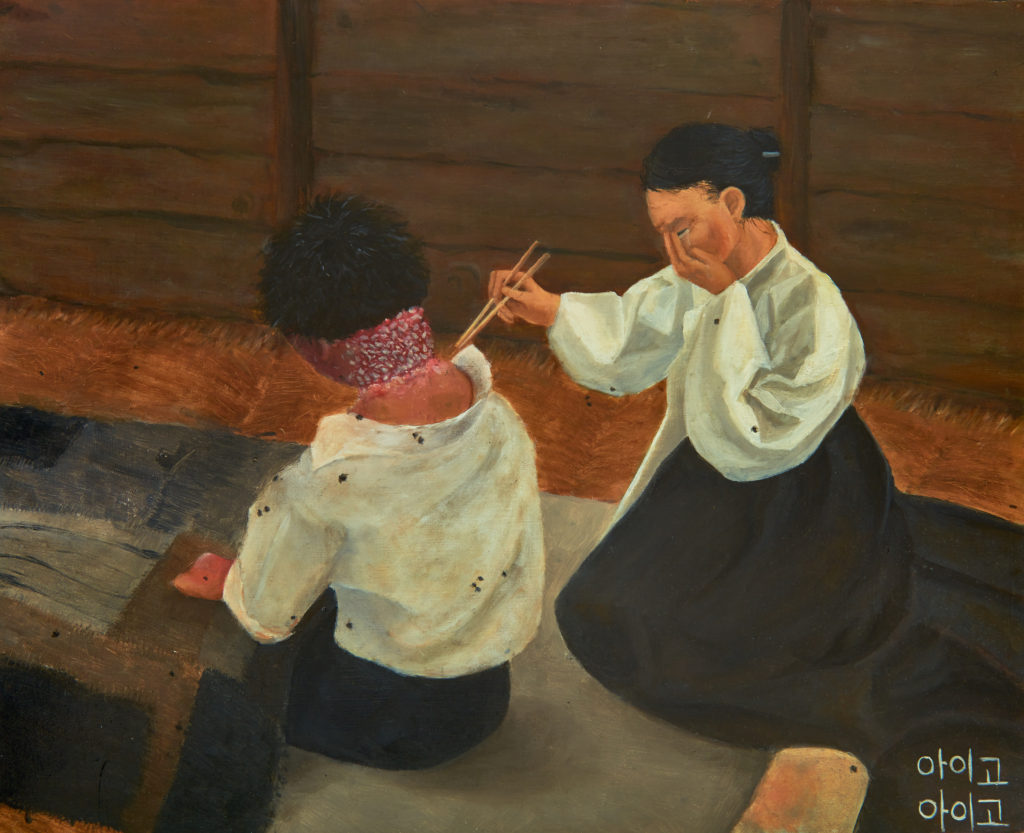Lee Jong-keun
"Don’t stay silent!"--Raise your voice!
5. Life after the A-bombing
For about a month after that, I had waves of diarrhea and vomiting. I also had burns on some places on my body which had not been covered with my uniform. I was not able to get out of bed until October. My father also suffered from diarrhea, vomiting and fatigue for a couple of months.
There was a branch of the National Railways Hospital near Hatsukaichi Station, and as I was a railway worker, I was able to receive medical treatment there. However, the only treatment I got was mercurochrome to apply to my burns. Although I applied some to my burns every day, they did not get better. Applying mercurochrome, the scars became scabs. When I peeled off the scabs, the white burn marks appeared again. So, I applied mercurochrome again and repeated the same thing every day.
The back of my neck was the worst. About a month after the bombing, pus began to ooze out from that scar, and the stench from it was terrible. Then maggots started to come out. My mother made grated cucumber and potato paste and put it on my wounds, but it didn’t work. She also fanned me so that flies wouldn’t swarm on the wounds and pulled out maggots with chopsticks. Doing so, she cried with tears, “Chugora!” which literally translates as, “I want you to die.” She might have thought that it would be better for me to die than to suffer from such terrible pains. Or maybe she was pessimistic about my future. In Korea, eldest sons are traditionally cherished and raised carefully. Even during the war when we couldn’t get anything, my mother got red beans from somewhere and cooked red bean rice only for my birthday. It was very painful for me to hear the word Chugora! from her.

At the hospital, I heard someone say that A-bomb survivors would die after their hair fell out. So, from the next day, I touched my hair every morning, and felt that I would be all right that day. I think it was the end of November or the beginning of December. One day, an old Japanese woman who sometimes passed by in front of our house brought a small bottle of rapeseed oil and said, “This is good for burns.” My mother applied it all over my body every day. The kind old lady brought another bottle around February or March of the following year, and thanks to the rapeseed oil, the maggots gradually disappeared, and my skin began to recover. Finally, I was able to return to work in March. However, my colleagues were aloof and didn’t come close to me, but I didn’t care about their attitude. At that time, it was believed that A-bomb diseases were contagious.
When I was 18, I was informed that I would be promoted to a full-time position. Until then, I was on probation, and the salary was paid on a daily basis. If I became a full-time employee, I would get a monthly salary of 57 yen a month. However, a clerk asked me to submit a copy of my family register. If I had requested the form from my home country, it would have taken about two months, but since I was hiding that I was a Korean, I didn’t give it to them, giving various excuses. Over and over again, the clerk said to me, “Mr. Egawa, please submit it as soon as possible.” Gradually, I couldn’t concentrate on my work, and one day, I suddenly quit my job, without telling anyone, getting paid, or returning my uniform.
Mr. Shimada, an elementary school classmate, was a truck driver, and he told me that he earned a monthly salary of 200 yen, so I went to driving school to get a driver’s license. Then I started working as an assistant at the Hatsukaichi branch office of the Prefectural Civil Engineering Office. About two years later, my coworkers found out that I was an A-bomb survivor, and it was also almost revealed that I was not Japanese, so I couldn’t work there anymore. By that time, my family had bought a house and moved to Senda-machi (Naka-ku, Hiroshima) near the Hiroshima Red Cross Atomic Bomb Hospital. There were about ten Korean families there, forming a community. I was employed as a truck driver at a company run by a Korean.
A couple of years after that, my father started raising pigs, so we sold our house in Senda-machi and moved to Wakakusa-cho (Higashi-ku) on the north side of Hiroshima Station. I also started a car broker company with my friend. I bought used American cars at the U.S. military base in Iwakuni and sold them in Hiroshima. My mother made and sold dobroku, an alcoholic beverage made from fermented rice, and later shochu, made from distilled doburoku. My younger brothers were civil engineers, so all my family members worked.